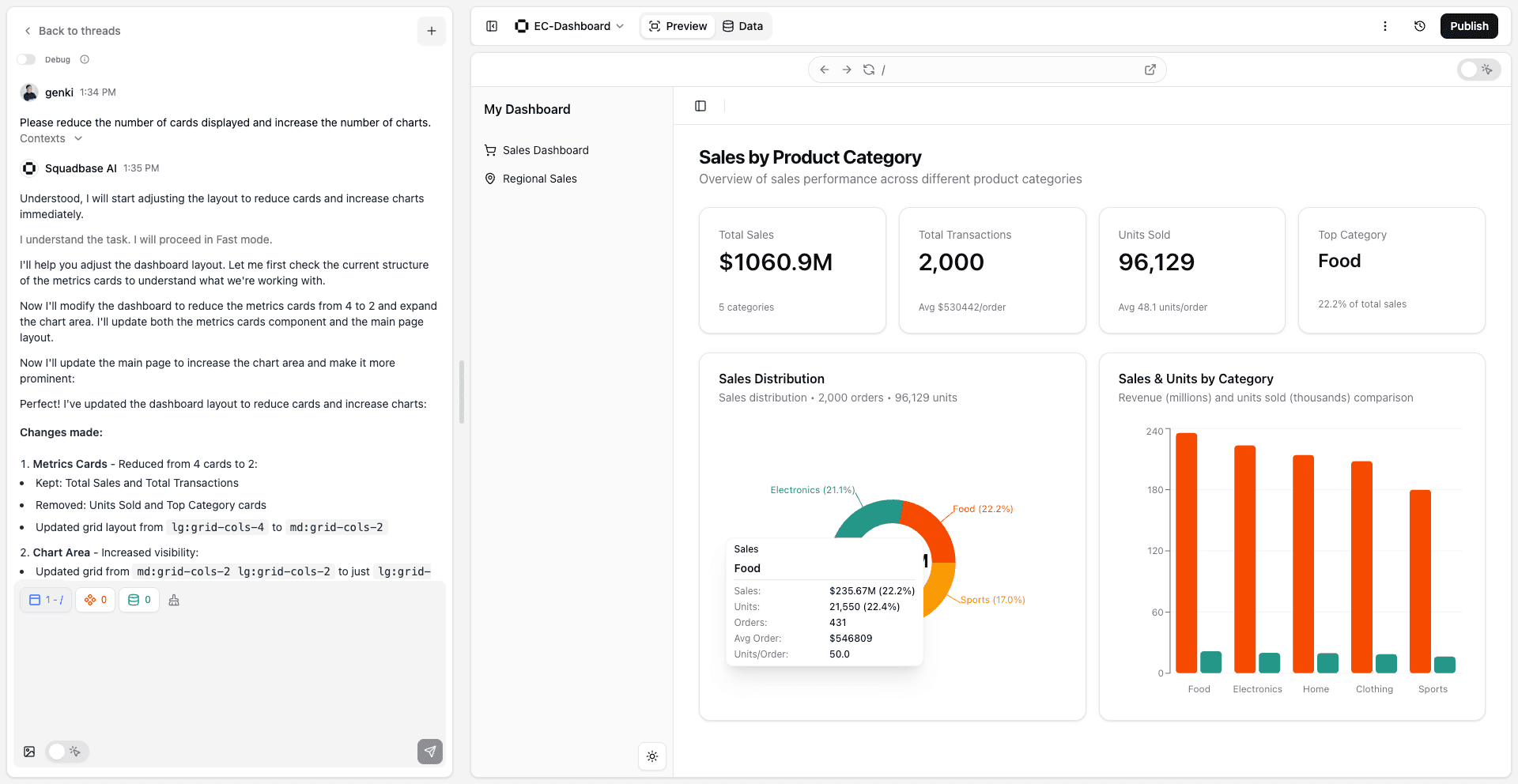Welcome to Squadbase
A vibe coding platform specialized for Business Intelligence. Create interactive dashboards and data applications through natural conversation.
Squadbase is a vibe coding platform specialized for Business Intelligence (BI). Create interactive dashboards and data applications through natural conversation. No need to learn complex BI tools or have SQL expertise.

Why Squadbase?
Transform how your team works with data. Instead of spending weeks learning traditional BI tools like Tableau or Power BI, simply describe what you want to analyze in natural language, and Squadbase's AI coding agent will build the dashboard for you.
Traditional BI Workflow
- Learn complex tools (SQL, data modeling, visualization grammar)
- Wait for data teams to build dashboards
- Static reports that are difficult to update
Squadbase Workflow
- Upload your data — Start with an Excel file or connect to a database
- Interact with AI to create analysis — Describe insights you need in natural language
- Share with your team — Get interactive dashboards that anyone can modify
Who is Squadbase for?
Business Users
Transform Excel files into interactive dashboards without writing code. Share insights with your team immediately, without waiting for the data team.
Data Analysts
Skip repetitive dashboard creation. Focus on answering business questions and let AI handle the implementation.
Engineering Teams
Provide an environment where the entire organization can safely work with data. Security, access control, and audit logs come standard, enabling enterprise-grade governance.
Key Features
🎯 Optimized for BI
Unlike generic vibe coding tools, Squadbase is optimized for data analysis:
- Native support for SQL databases and data warehouses
- Transparent data transformation pipelines
- Statistical analysis and visualization libraries included by default
🧠 AI that Learns Your Data
Squadbase's coding agent doesn't just understand SQL syntax—it learns about your business:
- Explores data schemas together
- Remembers conversation context
- Understands domain-specific terminology
📊 Complete Transparency
Every chart and metric shows exactly how it was calculated:
- Display SQL queries behind analyses
- Verify data transformation steps
- Ask AI to explain any part of the code
👥 Built for Collaboration
- Viewers are free — Share dashboards with unlimited team members
- Anyone can modify and explore analyses
- Analysis history is saved and reusable
🔒 Enterprise-Ready Security
- Secure execution environment with blocked external access
- Granular access control for data and dashboards
- Complete audit logs for compliance
Get Started in Minutes
Upload Your Data
Start with an Excel file or connect to a database.
Describe Your Analysis
Tell Squadbase what insights you need in natural language.
Show monthly sales trends by region,
and highlight regions with declining performanceShare with Your Team
Publish dashboards and invite viewers (viewers are free).
Why Vibe Coding for BI?
Traditional BI platforms create two user classes: "creators" who understand the tools, and "viewers" who can only look at dashboards. This creates several problems:
- Bottlenecks centered around data teams
- Stale dashboards that no one maintains
- Expensive licenses just to "view" data
Squadbase empowers everyone to create. The barrier between creators and viewers disappears. Data becomes a shared resource for organizational learning, not just output from a specialized department.